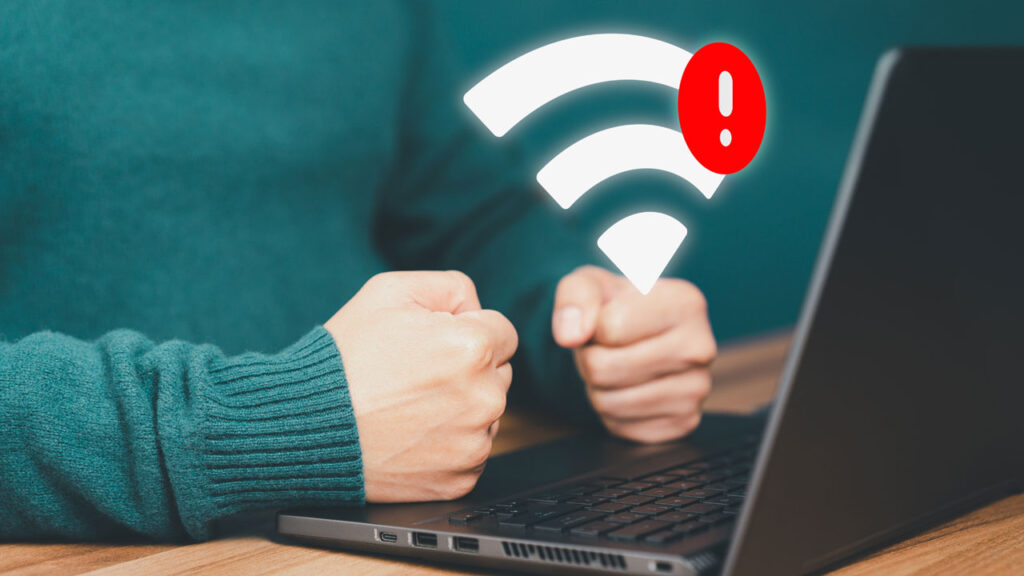Like most people, you rely on your home internet for everything from streaming entertainment to completing work assignments. So when your Wi-Fi keeps disconnecting, it can feel like the world is conspiring against you. It’s maddening, and you might find it challenging to know where to begin when troubleshooting the problem.
But fear not, if you’re dealing with internet that dropped out completely or Wi-Fi disconnects frequently, there are a few things you can do to try and resolve the issue. From simple fixes like resetting your router to more complex solutions like upgrading your equipment, there are plenty of options to explore.
In this guide, we’ll explore some of the most common reasons your home internet might keep disconnecting and offer some tips and tricks for fixing the problem. We’ll cover everything from signal interference to outdated equipment, so no matter what’s causing your Wi-Fi woes, you’ll have some actionable steps to take.
Why does my Wi-Fi keep disconnecting?
1. Your modem needs to restart
Sometimes the easiest solution is the most effective, if you’re experiencing issues with your internet, the first thing you should try is restarting your modem or gateway. It’s a simple step that can often solve problems like Wi-Fi that keeps cutting out, and a modem that keeps dropping out in speed.
Your modem is the device that connects your home to the internet, and it can sometimes get overwhelmed with traffic, causing it to slow down or disconnect altogether. By restarting the device, you give it a chance to reset and clear any issues that might be causing the problem.
To restart your modem, simply unplug it from the power source, wait for 60 seconds, and then plug it back in. Give it a minute or two to power up and reconnect, and then check to see if your Wi-Fi connection is working correctly.
If restarting your modem doesn’t fix the issue, a more profound problem might be at play. But it’s always worth trying this simple fix first, as it can often save you time and frustration.
2. Too many devices are connected
In today’s world, it’s common to have a plethora of devices connected to the internet. This can cause issues like completely losing internet connection or your Wi-Fi disconnecting frequently.
Here’s the scenario: you’re at home, with your laptop connected to the internet, your phone streaming music, your smart TV playing a movie and your gaming console downloading a new game update. Suddenly, your internet dropped out, and you’re left scratching your head. The problem is that all these devices compete for bandwidth, which can overload your network and cause it to slow down or disconnect. The more devices you have connected, the more strain is placed on your connection, and the more likely you will experience issues.
The solution? One is to limit the number of devices connected to your network at any given time. For example, if you’re not actively using your smart TV or gaming console, consider disconnecting them. Another option is to upgrade your internet plan or router to a more powerful one that can handle more devices.
3. Faulty networking cables
Your internet connection relies on a complex system of cables, an issue with one of these can cause the internet to keep disconnecting. The cables in question are typically LAN and fibre optic cables.
To troubleshoot this issue, start by checking all the cables that connect your devices to your modem or gateway. Ensure they’re securely plugged in, and there are no signs of damage like frayed wires or loose connections. If you suspect a particular cable might be the culprit, try swapping it out with a working cable to see if the issue is resolved. This can help you narrow down the problem and determine whether a faulty cable is to blame. If you’re certain your network cables are broken, too old or frayed, simply replace these cables. They’re relatively easy to find.
4. Radio interference
Radio interference can be a surprisingly common cause of disconnecting Wi-Fi. This phenomenon occurs when other wireless devices in your home use the same radio frequency as your Wi-Fi, causing signal interference. Common culprits include cordless phones, Bluetooth devices and SMART TVs.
To fix the issue, try changing the channel on which your Wi-Fi is operating. Use an application such as Wi-Fi Analyzer that tells you which Wi-Fi channels are most used. Pick a channel that is used the least to help minimise the chances of interference.
Another option is to use the 5GHz band on your Wi-Fi router. This frequency band is less commonly used than the 2.4GHz band, which many devices default to, and can be less prone to interference.
5. Bad router positioning
Your router’s position in your home can significantly impact the strength and stability of your Wi-Fi signal. If your router is placed in an obstructed location or is too far away from your devices, you might experience issues like Wi-Fi dropping out constantly.
To fix this issue, start by ensuring your router is placed in a central location in your home and not obstructed by walls, furniture or other objects. This can help improve signal strength and ensure your devices can connect reliably.
It’s also worth considering the frequency band that your router is using. The 5GHz band can provide a faster, more stable connection for shorter distances between your devices and router. For longer distances, the 2.4GHz band might be a better option.
6. Your household simply needs a new plan
If you’ve tried all the troubleshooting steps and continue to experience a lost internet connection, it might be time to consider upgrading your internet plan.
Households with multiple devices connected simultaneously, or that heavily stream video or other high-bandwidth content may need a more robust internet plan to support their needs. A slow, outdated plan can lead to dropped connections and frustratingly slow load times. Furthermore, considering a new plan gives you the chance to switch to a more reliable ISP.
When you upgrade your plan, you’ll also likely receive new equipment, such as a modem or router, that can help improve your internet connection. This new equipment can help prevent issues like internet that keeps disconnecting and provide faster, more reliable service.
To determine whether you need a new plan, consider your household’s internet usage and the number of devices connected at any given time. Research internet service providers and their various plan offerings to find a package that meets your needs and budget.
Internet dropped out on you? Jim’s I.T can help!
If your home internet connection is causing frustration and headaches, you’re not alone. Issues like Wi-Fi that keeps cutting out can result from various factors, such as outdated equipment or subpar service from your internet service provider. That’s where Jim’s I.T comes in.
Our team of skilled technicians offers a range of broadband internet solutions to help diagnose and fix the problem quickly and efficiently. We work with leading telecom companies such as NBN and IPTel to provide you with the latest equipment and technology to boost your internet connection.
Our same-day service, no-fix, no-pay guarantee and fully insured technicians provide you the peace of mind that your connection will be up and running in no time. Whether you need help with network installation, Wi-Fi set up or troubleshooting, our team can address any connection concern. Contact Jim’s I.T today to book a service and get back to the reliable, life-enhancing internet connection.

